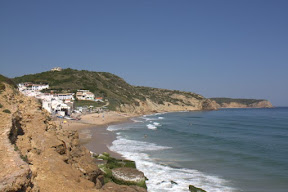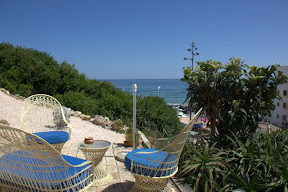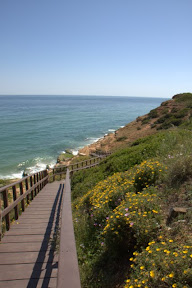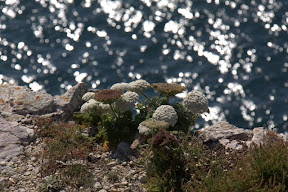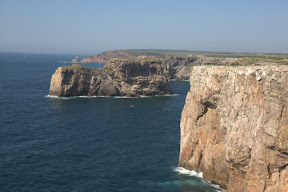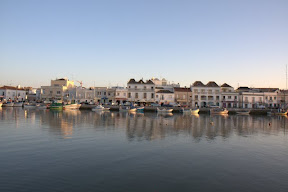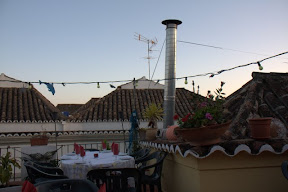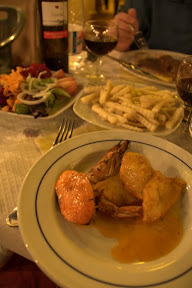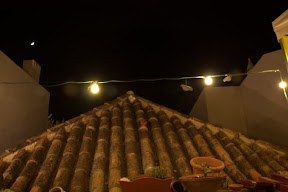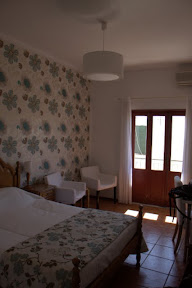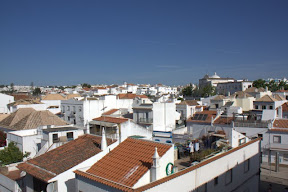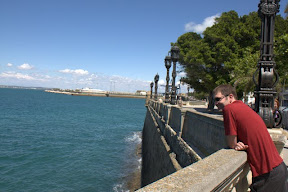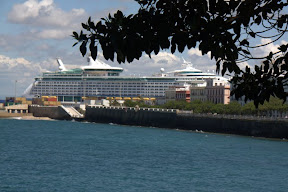What we did in Lisbon besides hang out in the ghetto and get our camera stolen.
Although our view of Lisbon will forever be tainted as the City Where Our Camera Was Stolen and We Stayed in a Ghetto, there is, of course, more to Lisbon than thieves and junkies. With its cityscape strewn over seven hills, old-fashioned wooden trolleys, and a long and high bridge designed by the same person who designed the Golden Gate Bridge, it is easy to see why people make comparisons to San Francisco.
| From Lisbon, Portugal |
The trendy Barrio Alto neighborhood is perched on a hill top with views of the rooftops below. We spent a little time there on a Saturday night, hopping between bars, drinking the sorrows over the stolen camera away. It seems that most people drink their beverages outside in the cobblestone pedestrian streets. The beer of choice in Portugal seems to be Super Bock or Sabre Sagres, both of which are unfortunately only a step above Budweiser. We had a Super Bock while we caught the end of the Inter Milan/Bayern Munich championship futbol game in a bar where rowdy patrons chanted in what must be their equivalent of Here We Go Steelers. Next, always drawn by live music, we wandered into a Cuban bar that had the best mojitos and a guy playing Beatles, Lenny Kravitz, and Bob Dylan on a guitar with a Latin twist.
Shortly after we sat down, the dorkiest tour group ever entered. In the span of 15 minutes, a group of about 20 middle aged people crowded the tiny bar. They were decked out with fanny packs, sweaters draped over shoulders, and flashing tiaras. They sipped one mojito, took a group photo, and then disappeared, leaving us and the other patrons to enjoy the guitar player. After checking out a couple of more places and the street scene, we followed the noise to an outdoor concert which sounded like skinhead music to us. The Barrio Alto is lively and festive, and definitely a fun place to spend a night.
One advantage of staying in our neighborhood was that there were many little restaurants where we were the only tourists around. Although truth be told, we much preferred the spicy piri-piri chicken or the dogfish in a traditional sauce we tried at a restaurant in Barrio Alto, not the salty grouper or fatty ribs we had a neighborhood place. It should come as no surprise by now that our (or at least my) favorite food was a pastry. After reading the glowing reviews of others who have gone before us, we travelled by tram to Belem to try pasteis de nada. Belem is a neighborhood with lots of museums and monuments, views of the bridge, and a lively park. In Belem, a bakery has renamed pasteis de nada nata to Pasteis de Belem. The line for the bakery wrapped up and down the sidewalk, but it didn’t take that long for a table. It appears that all this bakery does is churn out these Portuguese pastries, all day and night. I didn’t see one person out of the hundreds of patrons order something different. Once you try one, it is easy to see why. Served warm topped with powdered sugar and cinnamon, the pastries are flaky on the outside and creamy on the inside. This was the best Portuguese pastry we tried, perhaps because most of them are buttery and eggy, not fudgy and chocolately like I prefer.
Our day spent calling the insurance company, searching for the police station, and filing a police report (for insurance purposes) meant that we didn’t end up going to Sintra, a nearby fantasy land of forests and castles, like we wanted, for it was time to return our car in Spain. Having a car is fun to hit the open road, especially now that we picked up a cable for our Ipod, but it does hold us to a timetable. We already extended the rental once, and each day we spend in a city means potentially expensive parking and fees for a car we are not using. If we rent a car again, I’d do it for a region where we hopped around to small towns, because using it in cities is a waste.
Nude Beach
 |
| From Western Algarve |
The Algarve area of Portugal is tailor made for exploring due to the many beaches lining the southern coast of Portugal. As you go west, many of the beaches are tucked in between rocky cliffs. After Tavira, we headed west to Salema, a small fishing village in the southwest corner of Portugal, upon the recommendation of our friends Brad and Rachel. We used Salema as a base to explore the other beaches. Salema itself is located down a green meandering country road that leads to the ocean. (Unfortunately, most of my pictures of the town were the ones located on the camera card in our stolen camera, but I do have some.)
Since our hotel room had a small refrigerator, counter, knife, cutting board and a couple of dishes we took advantage and made some of our own meals. It also had a corkscrew, allowing us to get our own bottle of Portuguese green wine for under 3 euros. Since the Algarve is renowned for its seafood, we made sure to eat out one night and tried cataplana, a delicious and flavorful stew with fish, shellfish, tomatos, peppers and lots of spices cooked in special cookware.
We spent one day beach-hopping. Unlike the crowded, commercial or residential beaches at home, most of the land leading up to the beaches is protected and undeveloped. We drove down country roads lined with wildflowers, never sure what type of beach would pop up at the end. We happened to hit on the best one first. Tucked into between rocky cliffs, the sand was softer than the beach we visited on an island in Tavira. We found a spot between some beach rocks and listened to the waves crash up against the rocks. The Atlantic Ocean’s waters were still too nippy to do much swimming, but some people surfed in wet suits. Sean and a few other swimmers braved the waters for a quick swim.
It didn’t take long to figure out that the beach was divided into segments. Closest to the road, families with children made sand castles and frolicked in a pool of water leftover from high tide. Further down, it seemed to be mostly adults. Like the beach at Tavira, some, but not all, of the woman chose to go topless. But at the end of the beach – the most scenic part next to the rocky cliff – we quickly realized that many people, both men and woman, were full on nude. The men in particular seemed to strut up and down the sand in this section of the beach, scholongs waving back and forth. The funny part about nude beaches is that most of the people who are nude or topless aren’t the ones you probably would want to see. In case you were wondering, we both don’t feel the need for a head to toe tan. With my luck, I’d get a nasty sunburn in a place where the sun doesn’t normally shine.
Three Favorites in Tavira
Because of our delayed departure from Morocco that randomly placed us in the middle of Andalucia, we ended up meandering around Andalucia instead of following our original plan. So when we ended up in Seville, where a car was a hindrance instead of a help, we weren’t sure where to go to put our car to good use. We wanted to see the eastern part of Andalucia such as Granada and Costa del Sol, but it seemed our car would get in the way. Plus, we were less than 2 hours from Portugal’s border. In the end, the call of a new country beckoned too loudly, so we headed west. It fascinates me still that you can cross a country’s border just as easily as if you passed from Pennsylvania to Ohio.
We landed in Tavira, one of the first towns along Portugal’s Algarve region. Our friends Brad and Rachel recently visited Portugal and were smitten with the Algarve, and we could see why. Supposedly in July and August this area is overrun with tourists. While we weren’t the only visitors, it seemed like the perfect time to visit, as it was not crowded but the weather was warm and sunny (in the 80s) each day.
Tavira is a small little town with good vibe. It is not right on the coast, and you have to take a ferry to the beach, which is located on a nearby island. A small river runs through town, with pedestrian bridges leading you to each side. The buildings lining the river shine with the sunlight and reflect their images onto the water. Many of the buildings in town are white with red roofs, and those that are not are covered in colorful Portuguese tile. There seemed to be many ex-pats who have settled there, such as the British B&B owners, the shop owner from Wales, and the German woman running the Laundromat.
| From Eastern Algarve |
We sensed a strong UK presence. We saw magazines geared to British tourists, pubs with British and Irish beers, and English on all of the menus. Many of the tourists spoke English, but with a much different accent than our English. A waiter wanted to know where our unique accent was from, because we didn’t sound like the others. He said he didn’t see many people from the United States. We’ve heard that many tourists skip Portugal because it is just a sliver of land bordering Spain, and there is so much to see in Spain. While we love Spain, Portugal was fun and different and definitely worth seeing in its own right.
Some of our favorite things about this trip so far are located in Tavira. Every meal we had in Tavira was good, but our dinner at Restaurante Patio stood out. We ate dinner up on the terrace. The prawns I ordered were huge, and interspersed between grilled vegetables, sausage, and juicy chunks of pineapple. They were brushed with nothing more than a few spices, olive oil, and the pineapple juice. Sean equally enjoyed his traditional Portuguese dish, some sort of steak with a flavorful sauce. Unfortunately, although we heard rumors of Portugal being cheap, we found the meals to be more expensive than many of the meals we had in Spain. This is mostly because they practically force feed you starters. They will bring starters and charge you for them, whether you order them or not. There is a charge for bread, a charge for butter, a charge for cheese, a charge for olives, a charge for sardine pate, and a charge for marinated carrots (this charge I could forgive, because they were tasty).
Tavira also had a number of cute shops, but again, one stood out in particular. Casa das Portas is a small shop, but it is chock full of many treasures. Every direction in which you looked was filled with beautiful objects. I wanted to buy the whole store. Between the bags, the wall hangings, the pictures of Tavira’s doors taken by the owner, the scarves, and the jewelry, I was in heaven. The whole shop was filled with color. You can take a trip around the world right in the shop, because many of the items are from artists around the world. The owner, Jane Gibbons, told me she tries to buy items that are fairly traded. The owner is a very sweet and helpful woman with an adorable accent. She is originally from Wales. She began visiting Tavira a number of years ago, and opened the shop in 2007. She went out of her way to show me all of the options, and even volunteered that a necklace I was looking at came in a smaller, less expensive version in case I wanted to spend less.
I made a separate trip back without Sean so I could spend time lingering over all of the beautiful things in the store. To Sean’s dismay (but not surprise) I did not walk out empty handed. In my defense, we were headed to the beach later that day, and if I had not bought a purple and rose striped tote bag from London, we would have had to bring our small backpack and gotten it all sandy. It also came in handy for our trips to the grocery store for our picnic lunch. In my further defense, it is not like we planned to visit Columbia, so I could not have bought the bright, multi-colored necklace made from tagua (vegetal ivory) and dyed with natural dyes anywhere else. Nor was Indonesia a definite on our list, so the purple three strand bracelet made from coconut shells was a good buy. Believe me, only purchasing three items was restraint. If the multi-colored beaded or silver necklaces from an Australian artist hadn’t been over a hundred euros, I might have given them serious consideration. And then there was the spiral wall hanging made from recycled paper in Brazil…if only it wasn’t too big to fit in the backpack.
We also loved the place where we stayed. We did not have a guidebook for Portugal, and picked a hotel/B&B on a whim. We are very glad we did. The place where we stayed, Residencial Hotel Por do Sol, is hands down the best place we stayed so far. It had everything but a hairdryer. (I’ve only encountered about 4 or 5 hairdryers on this trip. Except for Matt’s Parisian apartment, all of the hairdryers have been puny, wimpy ones – nothing to get excited over). We had booked a room on the terrace, but Miguel, the owner, upgraded us for no charge into a bright and sunny room on the second floor. The room was stylish, and had a desk and two chairs in addition to the comfortable bed. (It gets very old having nothing but a bed to sit on all of the time). We had a television with English speaking channels. We had a balcony, which even came with a clothesline so we could dry our laundry in the sun as the Portuguese do. We had a small refridgerator. And after a stretch of many rooms without wifi at all or only in a common area, it was glorious to have wifi right in our room. The hotel was in walking distance to all of the shops and restaurants of Tavira, and Miguel was full of advice about places to eat in Tavira and things to do in the Algarve. Breakfast (fresh squeezed orange juice, coffee, croissants, meats and cheeses, and fruit salad) was served on the terrace overlooking Tavira’s rooftops. The best part? The room was only 44 euros per night (about $55).
We didn’t want to leave Tavira, and considered staying another night. But then the internet went down, so we headed West (you know, out Californee way) to get us some internet.
Seriously salty fish.
I don’t have a whole lot to say about Cadiz other than man, is the fish salty. The town is nice, lots of shopping, beautiful walkway on the water, etc but all I will remember is the saltiness of the fish I tried at dinner. It was one of those ordering situations where you come away not entirely sure what you had actually ordered. I suspected I was getting the waiter’s recommendation, which would have been fine with me, except it was the.saltiest.thing.i.have.ever.eaten. And it was swimming in oil. I believe it was bacalao (salted cod), but seeing has I wasn’t even hundred percent sure I ordered a main dish, what do I know.
I managed two bites. Sean took pity on me and tried it. He managed two bites as well. One to try it, and the second because you think, surely, it could not possibly be that salty, can it? It is. I moved it around my plate to try to make it look like I ate it, on account of the recommendation and all, but the waiter was on to me. Our first miss in our Spanish dining. Oh well. Bound to happen at some point.
Trapped in Morocco (Also Known As The One Where the Volcanic Ash Cloud Strikes Again)
EDITED TO ADD: I wrote the first part of this post as we waited to leave Morocco, the first time, and the second part once we got out.
PART ONE:
As we prepare to leave Morocco after two weeks in the country, we both can’t help but feel excitement at leaving.
By the time we got to Fes, we didn’t care to see another medina, historic or not. We were sick of the tagines that dominate every meal except breakfast. Breakfast, too, was like groundhog day for 14 days straight: orange juice, tea, yogurt, Moroccan bread with apricot jam, possibly a crepe like pancake if you are lucky, a fried egg mislabeled omelet if you were not. (Not bad, I know, but I’m American and I need variety). Although we rarely stray from the local cuisine while travelling, we found ourselves eating pizza three times. We had no desire to shop anymore because we had no desire to negotiate. Most of all, we were sick of paying too much for things, but we were so tired we found ourselves giving in all too often.
Our last day started with a leak in the shower hose, which blasted water sideways in our faces, on the ceiling, and finally, when it really started to get out of control, on the loose wires on the bathroom light. Mailing our purchases home involved a man who appeared to work for the post office offering friendly and much needed assistance, which quickly, of course, turned into a demand for hundreds of dirham. Opting for the 7 dirham bus ride to the airport instead of the 120 dirham grand taxi (less than 1 USD versus 15 USD), a man was in the process of reaching into the side pocket in my backpack when Sean turned around, yelled sharply, and scared him away. Out of the bus windows, we watched a fight between teenagers, and I spotted one of them wielding a large knife. Luckily, that wasn’t our stop. Now, we sit in Fez’s small airport, counting down the hours until we can board our plane.
Does this mean we didn’t like Morocco? I don’t think that it does. People who have travelled here before have raved about the country, and we can see why. As I talked about in my last post, the country has beautiful landscapes. Morocco has history, architecture, and vibrant colors. It also has friendly people, such as the woman who came to our rescue when a “parking attendant” tried to gouge us for more money than we likely owed for parking on a public street, or the woman on the bus who would have conversed with us had we known French but confirmed that indeed, the bus was heading to the airport, or the man next to us at the café who insisted we share his chocolate bar.
I just think you need to be in the right frame of mind to deal with certain elements of travel, and we were not in that frame of mind. I don’t feel we can give a trustworthy review of what it is like to travel through Morocco. I only feel qualified to give a trustworthy review of what it is like to travel through Morocco when you are ill for most of the journey. As with any travel, there are good things and bad things. It’s just when you are sick, all of the bad things are magnified and the good things are dampened.
As I mentioned in an earlier post, we got food poisoning while we were in Marrakesh. Bad food poisoning. Not just unsettled stomachs or even traveler’s diarrhea. Possibly from eating at the bustling food stalls in the main square like Eva and Jeremy from Forks and Jets? Possibly from a milkshake that we thought was safe, but perhaps contained ice or sour milk? We are not sure what was the cause, we just know that we spent a horrid night paying the price. From that night on, we have not felt right, culminating in another awful day we spent holed up in our hotel room in Meknes. We barely saw Meknes, and gave Fes complete short shrift.
One also has to keep in mind that we are still getting our sea legs. Morocco is the first time we have travelled through a truly foreign country, one where the people do not look like us or speak like us. One where standards are much different than those in the United States. Much of Morocco is more modern than what we initially experienced in Essaouira, particularly the cities we visited: Marrakesh, Ouarzazate, Meknes, Fes. This is particularly the case in the ville nouvelles, which are the “suburbs” set up by the French during their rule by taxing the Moroccans living within the old, crumbly medina walls. Much of Morocco is less modern than what we initially experienced in Essaouira. In the villages, the only sign of modern life is often the guesthouses and the Coke for sale everywhere under the banner with a picture of a sultry Arabian woman.
While I was curled up on the bed in a ball with stomach pains in Meknes, being forced to listen to an hour long call to prayer blasting over the loud speakers from somewhere in town, Sean and I discussed our next destination. It was supposed to be Egypt, then Jordan, then South Africa. We knew Egypt was going to be quite foreign like Morocco. We have heard that while the pyramids are amazing, you have no choice but to be subjected to very aggressive people in order to see them. We realized that we were not up for that right now, and discussed other options. That’s the beauty of travelling without firm plans. We really liked Spain while we were there, and cut it short to go to Paris. When we saw a cheap flight to Madrid from Fes, we knew that’s where we wanted to go next. When we found a cheap car rental, we put our plan into action. We plan to drive in a circle from Madrid for 11 days, to Valencia, along the coast, to Seville, to Lisbon, Portugal, then back to Madrid. We will need to watch to keep it cheap, because Morocco really blew our budget unexpectedly. After Spain, our itinerary will be similar, just in a different order. Stay tuned for Spain part dos…
PART TWO:
So I wrote Part One of this post as we waited at Fes’s small airport for hours for our flight. The airport was much smaller than we anticipated, given Fes’s size and stature in the country, and not well marked. We finally figured out which of the long lines was the one for Ryan Air to start the check in process for our flight to Madrid. At some point, we realized we were the only ones with larger bags. Sean went to figure out why. When he returned, he did not look happy. They are saying it is cancelled, he said, incredulously. It was true. Ryan Air cancelled our flight. Our way out! We read an article later that night about how the volcanic ash cloud grounded most of Ryan Air’s flights. That would have been nice to know earlier. We had no access to television and very little access to the internet for days. After we found out it was cancelled, we waited for an hour and a half to get our money back. We didn’t know what we were waiting for, exactly, and we couldn’t understand any of the gossip circulating through the line. I call it a line, but that is a misnomer. People of various nationalities felt the need to push in front of others, and Moroccans got to jump to the head of the line.
When we finally returned to Fes, taking the grand taxi this time, it was too late to attempt to catch a train or bus out of town. I would have paid any amount of money to take a flight to anywhere, but there were no more flights leaving that day. We went to three hotels in Fes before we found one with space for the night. Walking around, with our heavy packs, surrounded by cars and people walking around in a free for all, I said, I never have wanted to leave a place so badly in my entire life. I wasn’t being melodramatic. I meant it. I felt trapped, and I didn’t like it. A cancelled flight shouldn’t be a big deal to people with no schedule, but there couldn’t have been a worse time for us to have our flight to be cancelled.
We caught a 6 hour long train to Tangier at 6:50 the next morning, and took a 45 minute long ferry to Tarifa, Spain – the closest access point back to Europe. It was overcast, rainy and dreary in Tangier, but the sun was shining and birds were chirping in Tarifa. We found a hostal with a comfortable bed and light, airy room. Tarifa looks like a fun, eclectic windsurfing and kitesurfing town. I think we’ll stay another night.
